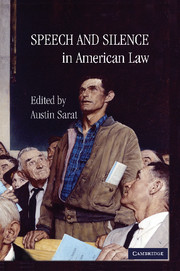Book contents
- Frontmatter
- Contents
- Contributors
- Acknowledgments
- Introduction: Situating Speech and Silence
- 1 “Our Word Is Our Bond”
- 2 Powell's Choice: The Law and Morality of Speech, Silence, and Resignation by High Government Officials
- 3 Anonymous: On Silence and the Public Sphere
- 4 Freedom of Expression, Political Fraud, and the Dilemma of Anonymity
- 5 Speech, Silence, the Body
- Index
- References
3 - Anonymous: On Silence and the Public Sphere
Published online by Cambridge University Press: 04 August 2010
- Frontmatter
- Contents
- Contributors
- Acknowledgments
- Introduction: Situating Speech and Silence
- 1 “Our Word Is Our Bond”
- 2 Powell's Choice: The Law and Morality of Speech, Silence, and Resignation by High Government Officials
- 3 Anonymous: On Silence and the Public Sphere
- 4 Freedom of Expression, Political Fraud, and the Dilemma of Anonymity
- 5 Speech, Silence, the Body
- Index
- References
Summary
The Public Sphere and the Irrelevance of Silence
Typically, when scholars depict ideal public spheres or analyze real ones, they focus on constitutive patterns of speech and communication, not silence.
Thus, for Hannah Arendt:
The term ‘public’ signifies two closely interrelated but not altogether identical phenomena: it means, first, that everything that appears in public can be seen and heard by everybody and has the widest possible publicity. For us, appearance – something that is being seen and heard by others as well as by ourselves – constitutes reality. Compared with the reality which comes from being seen and heard, even the greatest forces of intimate life – the passions of the heart, the thoughts of the mind, the delights of the senses – lead an uncertain, shadowy kind of existence unless and until they are transformed, deprivatized, and deindividualized, as it were, into a shape to fit them for public appearance…. Second, the term ‘public’ signifies the world itself, in so far as it is common to all of us and distinguished from our own private place in it… Such a common world can survive the coming and going of the generations only to the extent that it appears in public. It is the publicity of the public realm which can absorb and make shine through the centuries whatever men may want to save from the natural ruin of time.
- Type
- Chapter
- Information
- Speech and Silence in American Law , pp. 106 - 133Publisher: Cambridge University PressPrint publication year: 2010
References
- 7
- Cited by



